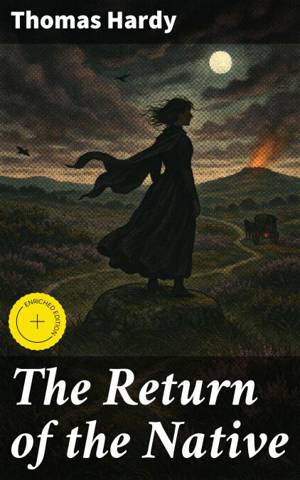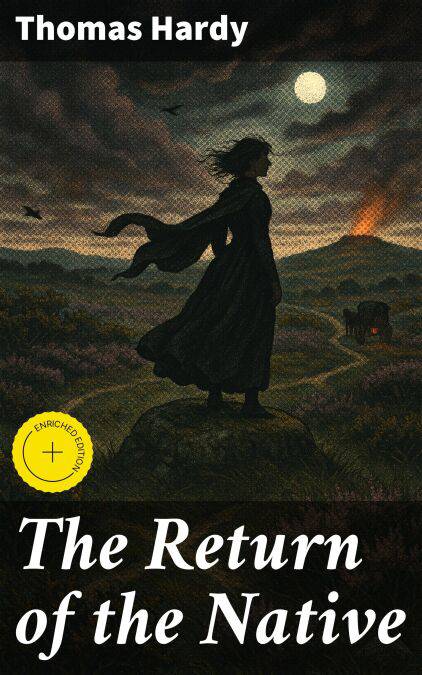
- Afhalen na 1 uur in een winkel met voorraad
- Gratis thuislevering in België vanaf € 30
- Ruim aanbod met 7 miljoen producten
- Afhalen na 1 uur in een winkel met voorraad
- Gratis thuislevering in België vanaf € 30
- Ruim aanbod met 7 miljoen producten
Zoeken
The Return of the Native E-BOOK
Enriched edition. Love, Betrayal, and Fate: Exploring Victorian England's Rural Life Through Thomas Hardy's Literary Classic
Thomas Hardy
E-book | Engels
€ 0,49
Uitvoering
Omschrijving
Set against the rugged backdrop of Dorset's Egdon Heath, Thomas Hardy's "The Return of the Native" is a poignant exploration of character, fate, and the clash between personal ambitions and the inexorable forces of nature. Written in a richly evocative style, the novel delves into the lives of its inhabitants as they grapple with love, desire, and societal expectations. Hardy employs a third-person omniscient narrative, blending naturalistic descriptions with deep psychological insights, illuminating the struggles of his characters against the harsh reality of their environment. The thematic relevance of the novel, published in 1878, reflects Hardy's critical stance towards Victorian conventions and his deep appreciation for the rural landscape, marking it as a significant work in the canon of English literature. Thomas Hardy, a novelist and poet from a working-class background, drew on his own experiences and observations of rural life to craft his stories. His intimate understanding of human emotions and relationships, combined with a yearning for social change, informs much of his work. "The Return of the Native," in particular, illustrates Hardy's existential concerns'—a reflection of his belief in an indifferent universe shaping human destinies. Readers seeking an exploration of the intricate interplay of fate and free will, set within the moody confines of a striking landscape, will find "The Return of the Native" a compelling choice. Hardy's masterful prose and profound insights make this novel not just a tale of love and loss, but a meditation on the human condition itself.
In this enriched edition, we have carefully created added value for your reading experience:
- A succinct Introduction situates the work's timeless appeal and themes.
- The Synopsis outlines the central plot, highlighting key developments without spoiling critical twists.
- A detailed Historical Context immerses you in the era's events and influences that shaped the writing.
- An Author Biography reveals milestones in the author's life, illuminating the personal insights behind the text.
- A thorough Analysis dissects symbols, motifs, and character arcs to unearth underlying meanings.
- Reflection questions prompt you to engage personally with the work's messages, connecting them to modern life.
- Hand‐picked Memorable Quotes shine a spotlight on moments of literary brilliance.
- Interactive footnotes clarify unusual references, historical allusions, and archaic phrases for an effortless, more informed read.
In this enriched edition, we have carefully created added value for your reading experience:
- A succinct Introduction situates the work's timeless appeal and themes.
- The Synopsis outlines the central plot, highlighting key developments without spoiling critical twists.
- A detailed Historical Context immerses you in the era's events and influences that shaped the writing.
- An Author Biography reveals milestones in the author's life, illuminating the personal insights behind the text.
- A thorough Analysis dissects symbols, motifs, and character arcs to unearth underlying meanings.
- Reflection questions prompt you to engage personally with the work's messages, connecting them to modern life.
- Hand‐picked Memorable Quotes shine a spotlight on moments of literary brilliance.
- Interactive footnotes clarify unusual references, historical allusions, and archaic phrases for an effortless, more informed read.
Specificaties
Betrokkenen
- Auteur(s):
- Uitgeverij:
Inhoud
- Aantal bladzijden:
- 391
- Taal:
- Engels
Eigenschappen
- Productcode (EAN):
- 4057664099365
- Verschijningsdatum:
- 18/11/2019
- Uitvoering:
- E-book
- Beveiligd met:
- Digital watermarking
- Formaat:
- ePub

Alleen bij Standaard Boekhandel
Beoordelingen
We publiceren alleen reviews die voldoen aan de voorwaarden voor reviews. Bekijk onze voorwaarden voor reviews.








